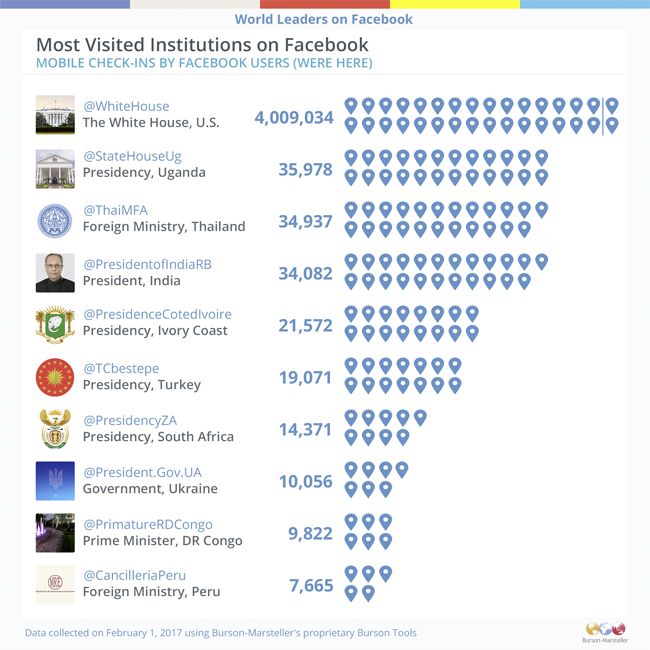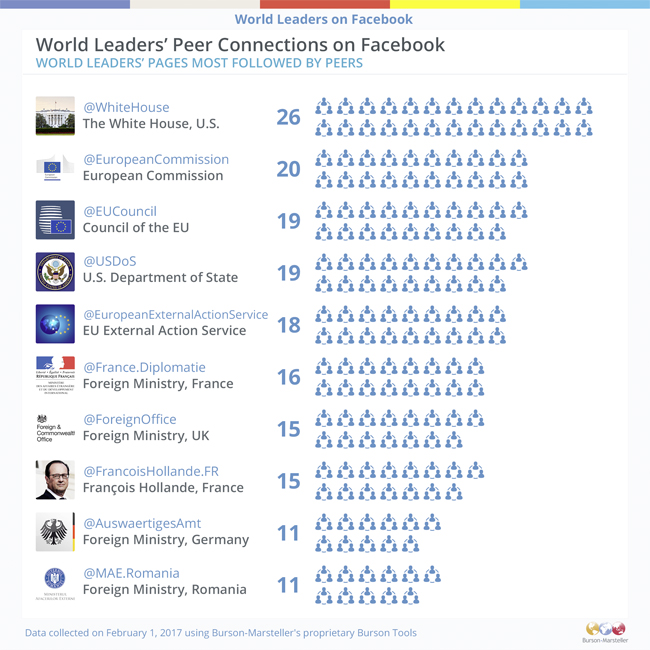Indian prime minister is the politician with the most Facebook followers
Narendra Modi tops the list of most successful accounts with 40 million "likes" on his personal Facebook page, making him the most followed politician on Facebook, followed by Donald Trump with 20 million "likes."

This is shown by the new study World Leaders on Facebook by Burson-Marsteller, a leading global public relations and public affairs agency. As of February 1, 2017, the Indian prime minister's institutional page, PMO India, was ranked third with 13 million "likes," followed by Queen Rania of Jordan in fourth place with 10 million followers. Turkish President Recep Tayyip Erdogan rounds out the top five with 8 million likes.

The study also documents the activity of the 590 Facebook accounts of heads of state, government and foreign ministers over the past year. The analysis is based on collected data from the Facebook Crowdtangle tool.
According to the report, Indian Prime Minister Narendra Modi's Facebook account also saw the most interactions (likes, comments, and shared content) in 2016 compared to all other accounts of leading politicians. With 169 million interactions, Modi's activity far exceeds that of the runner-up, Cambodia's Prime Minister Hun Sen, with 58 million interactions. The now-archived account @ObamaWhiteHouse is third with 36 million interactions, followed by Argentine President Mauricio Macri with just under 36 million. Former U.S. President Barack Obama's personal page completes the top five list with 30 million interactions in the past year. Interestingly, Barack Obama, who was recently the politician with the most Facebook followers with 52 million "likes," has one of the lowest interaction rates at 0.15 percent. In contrast, Albanian President Bujar Nishani leads in this measurement with a score of 10.79 percent.

Almost 90 percent of national governments have an official Facebook account. In addition, 87 heads of state, 70 heads of government and 55 foreign ministers maintain a personal page on the social platform, according to the study. Data collected in February 2017 shows that, unchanged from the previous year, 169 of the 193 UN member states maintain an official Facebook page.
"The second edition of Burson-Marsteller's World Leaders on Facebook study highlights how effective political communications are on this platform," said Don Bear, global chair and CEO of Burson-Marsteller. "It's exciting to see if business leaders will take a cue from political leaders and how they use Facebook, such as how to incorporate a personal touch into their communications."
Trump gives White House 20 million followers
On the day of his inauguration, January 20, 2017, U.S. President Donald Trump's Facebook account had 20 million followers, which is not only by far the highest number for a recently inaugurated president, but also represents a fourfold increase over 2016. His Facebook posts resulted in 290 million interactions last year, including 33 million pieces of shared content and 30 million comments.
Facebook is now one of the most important platforms for leading politicians and governments to interact with their constituents, citizens, and other key audiences. As of February 1, 2017, all those in power had a combined Facebook reach of 311,093,076 users. Last year, a total of 398,982 posts were made, which generated 772,441,676 interactions.
Although more than half of the posts contain images, the results of the study show that video posts generate the most interactions: 4,847 on average. For photo posts, on the other hand, there are only 2,935 interactions. The total of 47,739 videos posted on the pages of leading politicians were viewed a total of 2.5 billion times.
"We've seen over the past year how much influence social media can have on political decisions around the world," says Jeremy Galbraith, CEO of Burson-Marsteller Europe, Middle East & Africa and Global Chief Strategy Officer. "As the world's largest social network, Facebook has tremendous power and significant influence, which leaders know all too well."
With an average of 29 posts per day and a total of over 10,000 posts throughout 2016, the Ethiopian government's Facebook page is the most active. It is closely followed by the Botswana government with an average of 28 posts per day and the government of Honduras with 23 posts per day.
Other key findings of the study:
- The most visited institution is the White House, with 4 million check-ins, followed by the Ugandan State House with 35,000 and the Ministry of Foreign Affairs of Thailand with also 35,000 check-ins.
- The White House is the site followed by the most peer institutions and individuals. With 26 direct links, the White House thus leads ahead of the European Commission in second place with 20 links and the European Union in third place with 19 links.
- The pages followed by those in political power include the United Nations (marked "Like" by 39), followed by the European Parliament (marked "Like" by 25) and NATO (marked "Like" by 19).
- The governments, institutions and heads of state of 24 United Nations member states are not active on Facebook, one fewer state than in the 2015 study.
- British Foreign Secretary Boris Johnson and the UK Foreign Office are the only two official government pages following Donald Trump's new POTUS account. The Russian Foreign Minister's page is the only official government page that Donald Trump has directly tagged with "Like".





About the study
World Leaders on Facebook is Burson-Marsteller's latest study of how global leaders, governments and international organizations communicate via social media. The research builds on Burson-Marsteller's renowned annual Twiplomacy study, now in its fifth year. In 2016, the study was expanded to include all major social media platforms and examined the digital reputation of PR- and Public Affairs-Agency Burson-Marsteller has had a significant positive impact worldwide.
The whole study available at Burson-marsteller.com.








